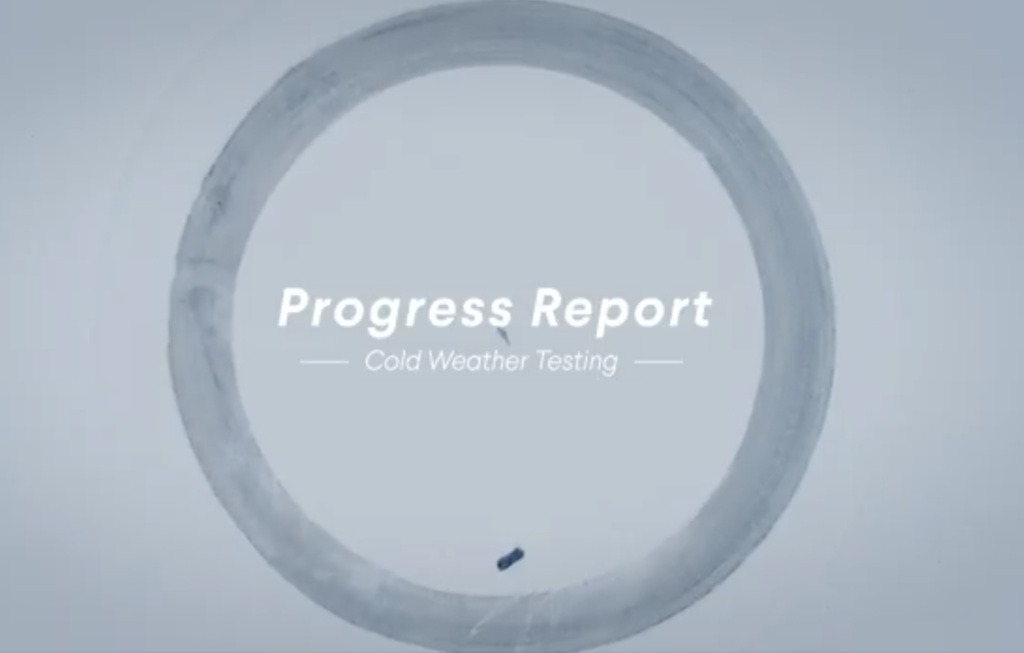Electric vehicle startup Rivian is continuing to unload impressive testing footage prior to the launch of its R1T all-electric pickup truck. The time the automaker shared footage of the electric pickup below freezing temperatures on the boarder of Minnesota and Ontario.
Rivian and its engineers took the R1T to such frigids temperatures to specifically test and refine explains its dynamics and battery performance. According to the startup’s “Stories” page, the testing took place just outside of Baudette Minnesota at a former US Air Force base that was repurposed to act as an automotive testing site. Automotive Enviro Testing (AET) is North America’s largest cold-weather testing facility and offers 25 courses, including snow and ice test tracks, a slush pool and five cold cells that are capable of storing vehicles at -40°F.
Making sure battery cells are efficient in cold weather is a key factor in producing a successful electric vehicle, as cold temperatures cause the chemical reaction happening inside of each battery cell to slow down. Possibly the reason why Rivian decided to brave the cold in order to make sure they are delivering the most efficient vehicle they can.
One of Rivian’s claims for the upcoming electric pickup is that when owners will be able to keep their EV plugged in overnight, and experience with no decrease in performance, even if it’s below freezing.
Rivian engineers took advantage of the testing facilities cold cells where they cold soaked R1Ts overnight at -40ºF, replicating an instance where an EV is left unplugged outside overnight. With these “cold soaking” test, Rivian engineers were able to develop self-heating methods in order to retain peak battery performance in tough conditions.
A Controls Integration Engineer for Rivian named Laura explains: “In extremely cold conditions we use some battery energy to keep the cells in our battery above 14°F to provide controlled vehicle performance. Some EVs have electrical heaters to heat the battery up, which is another component — more cost, more mass and a drain on electrical supply. Instead, we’re using our inverter and motor to generate heat — even while stationary our traction system can generate substantial heat for the battery. And we use that heat to warm the battery to the point where it can deliver full performance. Our battery is uniquely designed to operate in super cold conditions, all the way down to an ambient temp of -40°F.”
Freezing temperature battery testing isn’t the only thing Rivian was evaluating, as Rivian’s traction control team did their part to make sure the R1T was ready and able to take on slippery roads in wet winter conditions.
Rivian’s Director of Vehicle Dynamics explained: “We are simultaneously developing traction control, torque vectoring, regen slip control, anti-lock braking and electronic stability control with the goal to get them all to play nicely together — especially in the snow.”
Rivian engineers took advantage of the Automotive Enviro Testing (AET) snow and ice ring track as well, which was recently seen being taken on by GMC’s Hummer EV. This track was specifically designed to emulate a vehicle turning at high speeds on slick roads. Rivian engineers then use the data from the test to refine its traction control system, maximizing driver safety and vehicle stability.
The Launch Edition R1T will be the first version to see deliveries and has a starting price of $75,000. The base “Explore” version R1T starts at $67,500 but isn’t expected to be available until next year. Both vehicles have a claimed range of over 300 miles. Shorter and longer range battery options are expected to be made available later.

